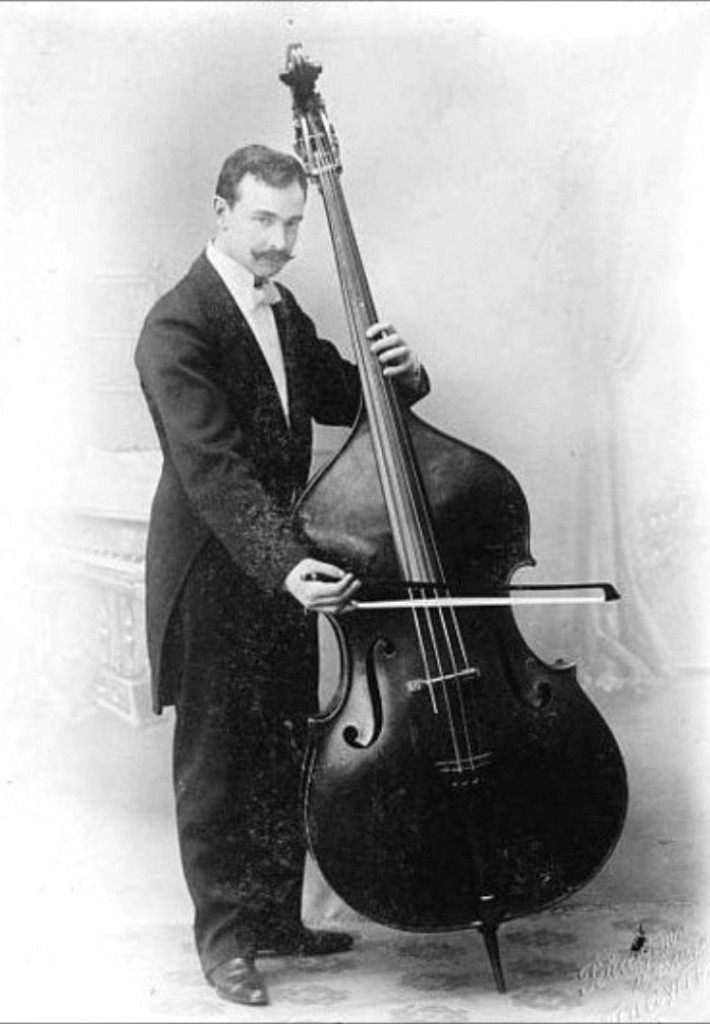A great night for bass at Rockport with rarities by Tubin and Koussevitzky

Bass music of Serge Koussevitzky (above) was performed at the Rockport Chamber Music Festival Friday night.
Serge Koussevitzky left an indelible mark on Boston’s musical life. The longtime conductor of the Boston Symphony Orchestra championed new music and commissioned and premiered a host of new works, many of which have found their way into the standard repertoire.
Less remembered is that Koussevitzky was a composer in his own right, having written several works for his own instrument, the double bass.
Two of Koussevitzky’s pieces were heard as part of a mostly Russian program presented by bassist Edwin Barker, violinist Yevgeny Kutik, and pianist Eileen Huang at the Shalin Liu Performance Center Friday night as part of the Rockport Chamber Music Festival.
For all of the cutting-edge works that Koussevitzky commissioned, his own music is conservative in nature, filled with a tender melodic writing that recalls the songs of Schumann. His Chanson triste and Valtz Miniature, scored for double bass and piano and heard Friday night, are short, delightful works that exhibit no small amount of lyricism.
Edwin Barker and Eileen Huang performed a poetic rendition of Chanson triste, with the bassist coaxing a warm, rose-colored sound from his instrument. The Valtz Miniature was equally delightful. Barker and Huang traded phrases of soft delicacy while keeping the dance quality ever present.
The bulk of the concert’s first half was dedicated to Eduard Tubin’s Concerto for Double Bass, heard in a reduction for double bass and piano.
The Estonian composer’s concerto is chock-full of operatic lyricism and calls for the soloist to play with a firm technique that takes one all over the instrument’s fingerboard. Cast in three movements played without pause, Tubin’s concerto bears resemblance to the music of Shostakovich. Textures are dotted with thorny passages, the writing is imbued with a sly humor, and there is an ever-present serpentine melodic line.
Barker, who serves as principal bassist with the Boston Symphony Orchestra, is a bassist’s bassist, capable not only of stellar technique, but a warm, inviting tone that has the quality of a superb vocalist. Barker’s performance of the Tubin concerto was colorful. His tone had a deep, resonant quality that managed to sing in all registers. The slow movement features a beautiful, winding melody, which Barker handled with sensitivity. Pianist Huang proved an equal partner and accompanist, supplying the angular music with soft touch.
The second half of the concert featured Russian music for violin and piano.
The three pieces Yevgeny Kutik performed Friday have a special meaning for the violinist. They were part of a stack of sheet music that Kutik’s mother packed in her suitcase when she and her family fled the crumbling Soviet Union.
Of those, Andrei Eshpai’s Rhapsody from Hungarian Tunes for Violin and Orchestra, heard in a violin-piano reduction, proved a real treat. Clocking in at five minutes, this bucolic work features free, arching melodies and fiery statements that churn over rippling piano accompaniment.
Kutik played with a fierce commitment and rich, radiant tone. The violinist possesses a remarkable ability to change the tone colors of his instrument on a dime, which results in finely shaded renderings of the music he plays.
Stravinsky’s Divertimento from The Fairy’s Kiss was a perfect vehicle to showcase this aspect of Kutik’s style, and the violinist gave a performance of live-wire intensity. His technique, at least in this performance, was not of the finest polish. Some of the piece’s difficult figures were muddled due to untidy fingerwork.
But those moments were rare. Kutik’s playing of the opening movement, with its hints of Tchaikovsky, had a romantic sweep, and he dug in for the agitated passages that followed.
Here too, Huang played with poise and polish though at times one wanted a bit more fire in her playing to match Kutik’s intensity.
The duo found common ground in Prokofiev’s Waltz from Cinderella. Here, the violinist’s tone took on a touch of silver while Huang proved a simpatico partner, shaping the phrases with tasteful rubato.
To close the program, Kutik and Barker teamed up for a lively rendering of a Passacaglia by Handel.
Originally written for harpsichord (as the final movement from his Harpsichord Suite No. 7), the piece unfolds in passages of ever increasing difficulty. Johan Halvorsen’s arrangement for violin and double bass preserves the original while adding colorful orchestral effects, such as pizzicato and glassy sul ponticello passages.
Throughout, Barker and Kutik played with polish and fine idiomatic style, each seeming to relish in the darting figures traded between them.
The next concert of the Rockport Chamber Music Festival will feature pianist Lise de la Salle in music by Beethoven, Brahms, Debussy, and Ravel 8 p.m. Saturday at the Shalin Liu Performance Center. rockportmusic.org; 978-546-7391
Posted in Performances